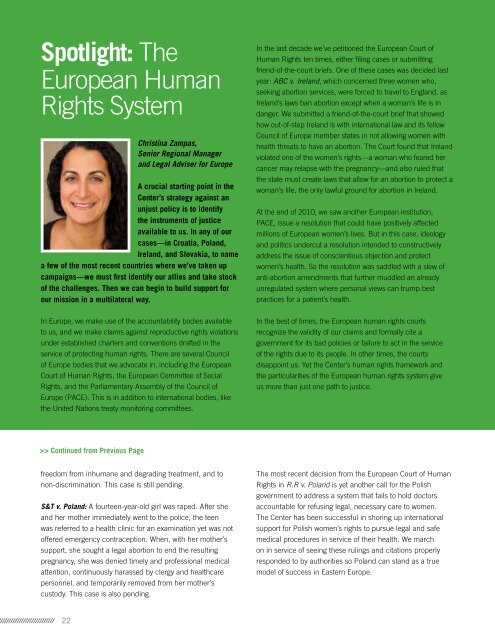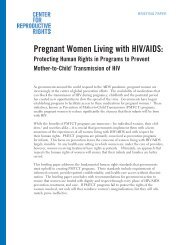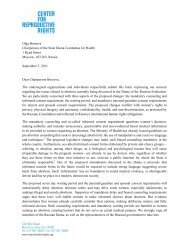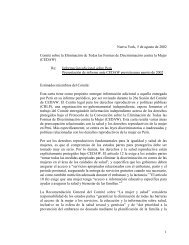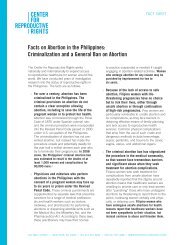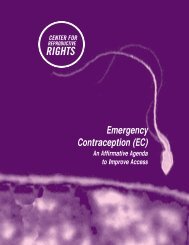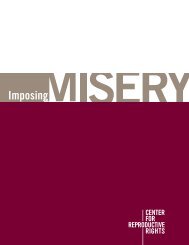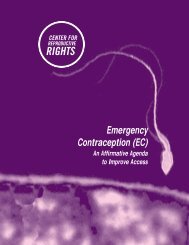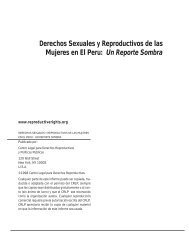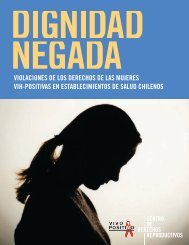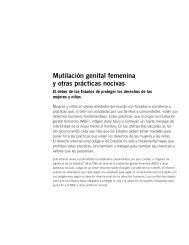Annual Report 2010-2011 - Center for Reproductive Rights
Annual Report 2010-2011 - Center for Reproductive Rights
Annual Report 2010-2011 - Center for Reproductive Rights
- No tags were found...
Create successful ePaper yourself
Turn your PDF publications into a flip-book with our unique Google optimized e-Paper software.
Spotlight: TheEuropean Human<strong>Rights</strong> SystemChristina Zampas,Senior Regional Managerand Legal Adviser <strong>for</strong> EuropeA crucial starting point in the<strong>Center</strong>’s strategy against anunjust policy is to identifythe instruments of justiceavailable to us. In any of ourcases—in Croatia, Poland,Ireland, and Slovakia, to namea few of the most recent countries where we’ve taken upcampaigns—we must first identify our allies and take stockof the challenges. Then we can begin to build support <strong>for</strong>our mission in a multilateral way.In Europe, we make use of the accountability bodies availableto us, and we make claims against reproductive rights violationsunder established charters and conventions drafted in theservice of protecting human rights. There are several Councilof Europe bodies that we advocate in, including the EuropeanCourt of Human <strong>Rights</strong>, the European Committee of Social<strong>Rights</strong>, and the Parliamentary Assembly of the Council ofEurope (PACE). This is in addition to international bodies, likethe United Nations treaty monitoring committees.>> Continued from Previous Pagefreedom from inhumane and degrading treatment, and tonon-discrimination. This case is still pending.S&T v. Poland: A fourteen-year-old girl was raped. After sheand her mother immediately went to the police, the teenwas referred to a health clinic <strong>for</strong> an examination yet was notoffered emergency contraception. When, with her mother’ssupport, she sought a legal abortion to end the resultingpregnancy, she was denied timely and professional medicalattention, continuously harassed by clergy and healthcarepersonnel, and temporarily removed from her mother’scustody. This case is also pending.In the last decade we’ve petitioned the European Court ofHuman <strong>Rights</strong> ten times, either filing cases or submittingfriend-of-the-court briefs. One of these cases was decided lastyear: ABC v. Ireland, which concerned three women who,seeking abortion services, were <strong>for</strong>ced to travel to England, asIreland’s laws ban abortion except when a woman’s life is indanger. We submitted a friend-of-the-court brief that showedhow out-of-step Ireland is with international law and its fellowCouncil of Europe member states in not allowing women withhealth threats to have an abortion. The Court found that Irelandviolated one of the women’s rights—a woman who feared hercancer may relapse with the pregnancy—and also ruled thatthe state must create laws that allow <strong>for</strong> an abortion to protect awoman’s life, the only lawful ground <strong>for</strong> abortion in Ireland.At the end of <strong>2010</strong>, we saw another European institution,PACE, issue a resolution that could have positively affectedmillions of European women’s lives. But in this case, ideologyand politics undercut a resolution intended to constructivelyaddress the issue of conscientious objection and protectwomen’s health. So the resolution was saddled with a slew ofanti-abortion amendments that further muddled an alreadyunregulated system where personal views can trump bestpractices <strong>for</strong> a patient’s health.In the best of times, the European human rights courtsrecognize the validity of our claims and <strong>for</strong>mally cite agovernment <strong>for</strong> its bad policies or failure to act in the serviceof the rights due to its people. In other times, the courtsdisappoint us. Yet the <strong>Center</strong>’s human rights framework andthe particularities of the European human rights system giveus more than just one path to justice.The most recent decision from the European Court of Human<strong>Rights</strong> in R.R v. Poland is yet another call <strong>for</strong> the Polishgovernment to address a system that fails to hold doctorsaccountable <strong>for</strong> refusing legal, necessary care to women.The <strong>Center</strong> has been successful in shoring up internationalsupport <strong>for</strong> Polish women’s rights to pursue legal and safemedical procedures in service of their health. We marchon in service of seeing these rulings and citations properlyresponded to by authorities so Poland can stand as a truemodel of success in Eastern Europe.In Slovakia: DemandingContraceptive AccessIn her autobiography, Slovakian writer IlonaLacková wrote about World War II: “It’s theend of the war, we’ve survived. After everydarkness comes the dawn. But after everydawn also comes the darkness.”Through the twentieth century and into the twenty-first, theworld has seen incredible political upheavals, not least ofwhich include the fall of communism. To various degrees,Slovak people have seen the dawn of a new prosperity in thetwo decades after the country separated into its own state,but the Slovak government’s failure to address barriers incontraceptive access leaves progress <strong>for</strong> women’s rightsbehind, in the darkness.In <strong>2011</strong>, the <strong>Center</strong> released a report titled CalculatedInjustice: The Slovak Republic’s Failure to Ensure Access toContraceptives. Through research and interviews with EasternSlovakian women, the report offers a thorough account of theways Slovak women are denied equal human rights by theircountry’s stagnant stance on sex education and the failureto subsidize contraceptives. The report’s release came justweeks be<strong>for</strong>e the Slovak Ministry of Health introduced a billthat would, <strong>for</strong> the first time, explicitly exempt contraceptivesfrom public health insurance coverage, effectively enshriningdiscrimination into law.Women and adolescent girls in Slovakia face numerousbarriers to accessing contraceptives and contraceptivein<strong>for</strong>mation. Contraceptives are not covered by publichealth insurance, which means that accessing af<strong>for</strong>dablecontraception is a significant challenge <strong>for</strong> millions ofwomen, especially low-income women, adolescents, andwomen in abusive relationships with their partners.Besides unaf<strong>for</strong>dability, other barriers include reliance ontraditional family planning methods like the withdrawalmethod, religious stigma stemming from the CatholicChurch hierarchy, and the ability of gynecologists andpharmacists to invoke conscientious objection and refuse todispense a prescription.As in other regions, the <strong>Center</strong> petitions humanrights bodies like the Committee on the Elimination ofDiscrimination against Women to stress the responsibilityEuropean governments have to treat reproductive rights asfundamental rights. In 2008, the committee issued <strong>for</strong>malrecommendations to Slovakia, urging the state to “takemeasures to increase the access of women and adolescentgirls to af<strong>for</strong>dable healthcare services, including reproductivehealthcare, and to increase access to in<strong>for</strong>mation andaf<strong>for</strong>dable means of family planning <strong>for</strong> women and men.”We have filed and been involved in a number of cases overthe last five years at the European Court of Human <strong>Rights</strong>,including cases on behalf of Romani women who were <strong>for</strong>ciblysterilized and were denied access to their medical records.In the case related to medical records, the European Court ofHuman <strong>Rights</strong> found Slovakia in violation of the right to privateand family life and the right to access to the courts. Laws havesubsequently been changed, but we still seek justice <strong>for</strong> thewomen denied access be<strong>for</strong>e the new laws came into play.The <strong>Center</strong>, through its litigation, fact-finding, and policyreports, is steadily working to bring the issue of Slovakianwomen’s reproductive rights—and the rights of Polish women,Irish women, and other European women—out of darknessand into the light of a new dawn <strong>for</strong> policymakers andlawmakers. We are demanding progress, and we are getting it.22 23 center <strong>for</strong> reproductive rights


